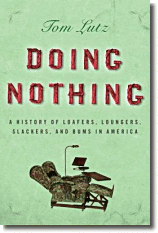 Tom Lutz, author of Doing Nothing: A History of Loafers, Loungers, Slackers, and Bums in America, is no slacker himself: he is a prolific author and professor of creative writing.
Tom Lutz, author of Doing Nothing: A History of Loafers, Loungers, Slackers, and Bums in America, is no slacker himself: he is a prolific author and professor of creative writing.I was lucky to catch him on the way to an appearance on ABC's 20/20 to talk about his book. I wanted to know: how well does the "page 69 test" work for Doing Nothing?
Here's what Tom reported:
In many ways page 69 is representative: In discussing the dean of the 18th century literary writers, Samuel Johnson, who created a character or persona called "The Idler," I talk about the way that character speaks to us: "We have met the Idler," I write, "and he is us." I also describe how, as in the case of many other writers and characters, Johnson's Idler is really not entirely idle. Johnson himself was, I go on to say, a closet workaholic who presented himself as a slacker, just as Benjamin Franklin, who usually is presented as an exemplar of the work ethic, is in fact a closet slacker. I crack wise a little on the page, so it's representative in that way, but it has perhaps a little more direct quotation from the person I'm talking about than usual: about a quarter of the page is in Johnson's words. That's in part because Johnson is fun to read, and I wanted to share that fun. Since the book is largely chronological, the attention to the 1760s is representative in that it's early in that chronology, not representative in that most of the book is about later eras. My guess is that sentence length, pacing, diction, style, etc., etc., is about the same as the whole.Thanks to Tom for the input.
Click here and here to read excerpts from Doing Nothing.
Doing Nothing earned the thumbs up from Dave Barry in the Sunday New York Times Book Review.
Larry Sears wrote in the Christian Science Monitor that this "book is a fascinating ... analysis of both workers and slackers throughout the past 250 years of Anglo-American history. It begins as a small family story and then expands into a complex examination of the duality of work and leisure, including commentary from a variety of writers and intellectuals."
Are you too lazy to read those excerpts and reviews? Then click here and listen to Yvette Doss talk about Lutz's book in a commentary for NPR.
Lutz is also the author of Crying: The Natural and Cultural History of Tears (1999). His American Nervousness, 1903: An Anecdotal History was a New York Times Notable Book in 1991.
So much for sloth. Looking for a deadly sin that might elevate your pulse? Click here.
Previous "page 69 tests":
Libby Fischer Hellmann, A Shot To Die For
Nelson Algren, The Man With the Golden Arm
Bob Harris, Prisoner of Trebekistan
Elaine Flinn, Deadly Collection
Louise Welsh, The Bullet Trick
Gregg Hurwitz, Last Shot
Martha Powers, Death Angel
N.M. Kelby, Whale Season
Mario Acevedo, The Nymphos of Rocky Flats
Dominic Smith, The Mercury Visions of Louis Daguerre
Simon Blackburn, Lust
Linda L. Richards, Calculated Loss
Kevin Guilfoile, Cast of Shadows
Ronlyn Domingue, The Mercy of Thin Air
Shari Caudron, Who Are You People?
Marisha Pessl, Special Topics in Calamity Physics
John Sutherland, How to Read a Novel
Steven Miles, Oath Betrayed
Alan Brown, Audrey Hepburn's Neck
Richard Dawkins, The Ancestor's Tale
--Marshal Zeringue





